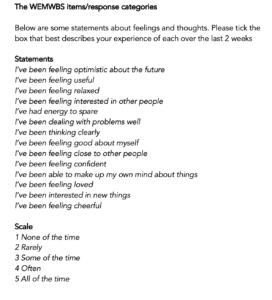Measuring mental wellbeing – looking back and moving forward
Today we publish a new paper by Professor Sarah Stewart-Brown on the history and development of the Warwick-Edinburgh Mental Wellbeing Scales (WEMWBS).
As a global expert in public health practice, Professor Stewart-Brown’s work on the development and validation of the WEMWBS scales has brought credibility to the concept of mental wellbeing and helped make mental wellbeing measurement practical and robust.
The WEMWBS scales are now commonly used in civil society and health sectors and in public sector outcome/wellbeing frameworks including in Scotland and Wales.
What are the Warwick-Edinburgh Mental Wellbeing Scales?
The Warwick-Edinburgh Mental Wellbeing Scales were developed to help measure mental wellbeing in the general population and to evaluate projects, programmes and policies which aim to improve mental wellbeing.
The 14-item scale has 5 response categories, summed to provide a single score. The items are all worded positively and cover both feeling and functioning aspects of mental wellbeing.

A shortened version of the WEMWBS (referred to as SWEMWBS) scales is also available. The seven items relate more to functioning than to feeling. As well as being shorter the scale can be transformed so that it can be used as an interval scale for psychometric analysis.
Insights and reflections
In her paper, fifteen years since she developed the scales, Professor Stewart-Brown reflects on the drivers that led to the WEMWBS, their primary users and the issues that their content and use raises for the practice of wellbeing measurement going forwards.
She discusses:
- The content and focus of the WEMWBS, including its suitability to evaluate programmes and policies.
- How WEMWBS use has extended beyond health and education services to include business settings.
- How the WEMWBS has acted as an agent of change, through its user-led development and the wellbeing benefits recorded for individuals who complete them.
- The growing popularity of the scales in the evaluation of workplace wellbeing interventions and internationally.
- The need to address issues in wellbeing measurement such as as potential ceiling effects of the scales as levels of population wellbeing rise
You can find guidance on using WEMWBS and other individual and community wellbeing measures in our online guidance and measures bank.
Call for evidence: new evaluation of interventions using the WEMWBS
Have you used the Warwick-Edinburgh Mental Wellbeing Scales (WEMWBS) to assess the impact of an intervention on mental wellbeing? Then we want to hear from you.
Together with Kohlrabi Consulting, we are reviewing evaluation literature that uses the WEMWBS scales to evaluate wellbeing interventions aimed at children, young people and adults. The project is funded by the National Lottery Community Fund.
We are interested in studies from across voluntary, public and private sectors, to summarise evidence on what works to improve mental wellbeing, for whom and in what contexts.
[gravityform id=5]
Our next projects
- Better Benchmarking – towards a Data Lab: We are scoping now how we can make SWEMWBS and other wellbeing population-level data more accessible to organisations so it’s easier to benchmark findings and do more robust evaluations of your project.
- Social Capital, Agency and Control: We are scoping a project to review evaluation evidence that uses social capital/community wellbeing measures (2021/22) and using Agency/Control measures (2022/23).
Get in touch at evaluation@whatworkswellbeing.org if you’re interested in these projects and want to help make them happen.
